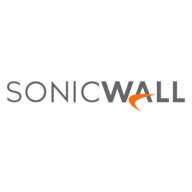


SonicWall TZ and Meraki MX are both leading products in the firewall category, with SonicWall TZ noted for its ease of use and high security, while Meraki MX leverages cloud-based management. SonicWall TZ is particularly user-friendly and cost-effective, whereas Meraki MX's cloud-focused approach offers seamless management capabilities.
Features: SonicWall TZ offers user-friendly firewall configurations, easy VPN setup, and high security, making it versatile for various organizational needs. It is also cost-effective, providing high throughput. Meraki MX is recognized for its robust cloud-based management, simple VPN configuration, and powerful content filtering. It also benefits from automatic firmware updates for enhanced functionality.
Room for Improvement: SonicWall TZ faces issues with its reporting tools, mail security, and support services, requiring a more intuitive interface and better application detection. Meraki MX requires enhancements in SSL inspection, integration capabilities, and more granular network controls. Both products could improve their user interfaces and scalability.
Ease of Deployment and Customer Service: SonicWall TZ provides predominantly on-premises deployment options with mixed reviews of its technical support, sometimes slow in response but typically effective. Meraki MX benefits from straightforward deployment due to its cloud-management focus, though feedback on customer service is mixed regarding consistency in expertise and response times.
Pricing and ROI: SonicWall TZ is competitively priced with a la carte options, appealing to small businesses, though annual renewals can raise long-term costs. ROI is quickly realized through security enhancements. Meraki MX is priced as a premium solution with higher initial and licensing costs, yet offers excellent cloud management that reduces IT overhead, providing solid ROI despite perceived high pricing.
Clients are now comfortable and not wasting productive hours on IT support.
We have experienced a positive return on investment by utilizing Fortinet's products.
There's definitely an ROI. Having a centralized way of managing and applying policies across the entire organization always helps.
That is a reason to buy a firewall, and it is challenging to put a monetary value on security.
He explained that it required a command line configuration, as it couldn't be done through the graphical user interface.
I would rate their support for FortiGate a nine out of ten.
They offer very accurate solutions.
Customer service is excellent.
They scale up really well from smaller models like the FortiGate 40 and 50 to bigger sites with the FortiGate 100 for more throughput - up to enterprise datacenters.
The variation comes in terms of the interfaces and throughputs, but from a security perspective, you get the same benefit, irrespective of whether you have an entry-level unit or an enterprise.
There are many options available, and we can choose the size of the box based on our requirements.
We have Juniper solutions, and I would say the Juniper solutions can scale better, however, this solution is still very scalable.
There are no bugs or glitches, and it doesn't crash or freeze.
Improper handling of these can lead to a memory surge, a well-known bug that can cause the entire system to freeze.
It is less stable than Palo Alto Networks and Check Point firewalls because there are lots of bugs in the latest firmware.
In terms of stability, SonicWall doesn't have performance issues.
SonicWall TZ is definitely stable and offers a good value for money.
If I have put 10 GBPS of throughput on a firewall and I enable all of these features available, such as IPS or UTM functionalities, the throughput comes down to 1 GBPS.
By providing an integrated solution, users would have access to all features and functionalities within a single window, eliminating the need to navigate through multiple windows.
Investing in a solution that can accommodate such growth would be more cost-effective than repeatedly purchasing new hardware.
Data is the only path, so optimization is essential.
Integration with other vendors, especially with VPNs, can be challenging and requires more effort when configuring.
SonicWall TZ could benefit from newer technology.
The VPN license should be improved by providing more free SSL VPN licenses.
Secure SD-WAN is free of charge.
The most expensive part is the renewal of the license subscription.
FortiGate is priced lower than Palo Alto.
In terms of pricing, I would say it is not the cheapest, but it was comparable to the others.
It is neither expensive nor cheap.
More licenses are required to purchase the perpetual license for SSL VPN and Global VPN.
When comparing similar products across vendors, there may be a small difference in cost.
I would also position its pricing as a three, where one is the lowest price and ten is the highest.
It's easy to monitor the end-to-end network through the firewall.
The firewall, IPS, and VPN functions are the most valuable features.
FortiGate provides solid protection against viruses, malware, and other threats.
We understand that Cisco solutions are very reliable, and we really like the simple management.
Since cybersecurity is my main concern, this type of miscommunication relating to vulnerability blocking is crucial.
For SMB segments, SonicWall performs well.
It was beneficial during COVID for remote work through its VPN functionality.
The advanced gateway security features such as web filter, application control filter, IPS, ideas, gateway antivirus, anti-spyware, and botnet filter are valuable.



Fortinet FortiGate offers comprehensive network security and firewall protection across multiple locations. It effectively manages data traffic and secures environments with features like VPN, intrusion prevention, and UTM controls.
Organizations rely on Fortinet FortiGate for its robust integration with advanced security policies, ensuring significant protection for enterprises, cloud environments, and educational sectors. It facilitates network segmentation, application-level security, and authentication management, securing communication within and between locations such as branches and data centers. Its efficient SD-WAN and UTM features enable streamlined data management and enhanced threat protection capabilities. Users appreciate its centralized management, facilitating seamless operations across diverse environments.
What are the key features of Fortinet FortiGate?
What benefits should users expect from Fortinet FortiGate?
Fortinet FortiGate is crucial in sectors like education, offering robust networks for secure data flow between campuses and facilitating remote learning. In enterprise environments, it allows efficient management of application traffic and security across multiple branches, while in the cloud, it seamlessly integrates with diverse platforms to enhance security infrastructure.
Cisco Meraki MX appliances are next-generation firewalls with all the advanced security services needed for today’s IT security. The appliances are ideal for organizations considering a unified threat management (UTM) solution for branch offices, data centers, distributed sites, or campuses. Since Meraki MX is 100% cloud-managed, installation and remote management are simple and zero-touch.
Meraki MX’s hardware and virtual appliances are configurable in Microsoft Azure, Amazon Web Services (AWS), and Google Cloud Platform, and private cloud support is offered through Cisco NFVIS and Alibaba Cloud.
Organizations of all sizes and across all industries rely on Meraki MX to deliver secure connectivity to hub locations or multi-cloud environments, as well as application quality of experience (QoE) through advanced analytics with machine learning.
Cisco Meraki’s advanced QoE analytics offers:
Cisco Meraki’s SD-WAN offers:
The Meraki MX’s SD-WAN is unique in that it can be easily extended to deliver optimized access to resources in public and private cloud environments with virtual MX appliances. Its SD-WAN lowers operational costs and improves the performance of remotely-accessed resources. Users can ensure the availability of the apps and services their employees use most through dynamic path selection, policy-based routing, support for application-layer profiles, and VPN.
Meraki MX offers industry-leading cloud management that has template-based settings which can scale easily from small deployments to tens of thousands of devices. It features an intuitive web-based dashboard for managing mobile devices, united firewalls, switching, and wireless LAN. Users can also benefit from role-based administration, configurable email alerts for a variety of important events, and easily auditable change logs. Meraki MX is capable of producing summary reports with device, user, and application details archived in the cloud.
Meraki MX Key Features
MX has a robust suite of network services in an all-in-one device, which saves you money by eliminating the need for multiple appliances. These services include:
Reviews from Real Users
Meraki MX stands out among its competitors for a number of reasons. Two major ones are its easy management and its ability to be accessed remotely. Below is some feedback from PeerSpot users who are currently using Meraki MX as their firewall security solution.
Craig B., a central services engineer at Liberty Technology, writes, “The web console for managing everything keeps everything on Meraki and keeps us from going somewhere else. It is why I think a lot of people like Meraki. Comparing it to SonicWall or even a different Cisco firewall, like traditional ASAs, managing Meraki is a thousand times easier because of fluidity. You don't have to rebuild a table just to change one rule. It's much more readable for a human.”
Edgardo C., an IT director, notes,”By using the VPN, we can connect remotely. We have two offices, and we could connect them through the VPN. We could establish a network between two sites, and that has improved and increased communication and productivity. Our remote site is able to access the server remotely.”
We monitor all Firewalls reviews to prevent fraudulent reviews and keep review quality high. We do not post reviews by company employees or direct competitors. We validate each review for authenticity via cross-reference with LinkedIn, and personal follow-up with the reviewer when necessary.